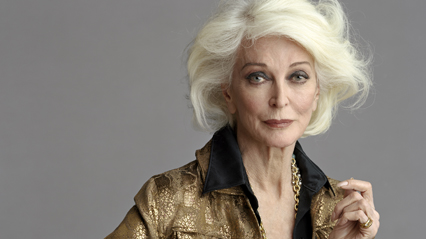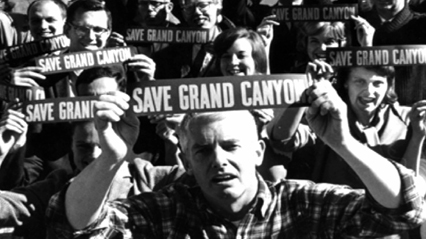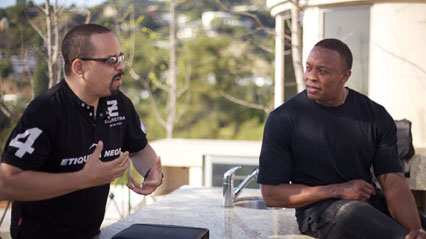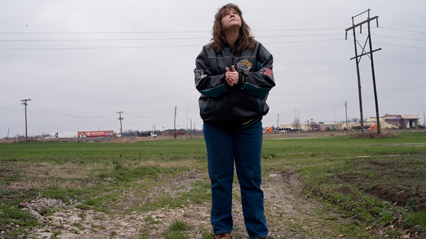

By Kim Voynar Voynar@moviecitynews.com
Sundance Preview: Documentary Premieres
From supermodels to rap to innocent men wrongly incarcerated, the films in the Documentary Premieres section at Sundance this year offer a wide array of topics from veteran filmmakers. There’s lots to choose from here, but here are the ones that have most caught my attention at this point. My must-see list is getting longer and longer; I may need to clone myself in order to see everything I want to this year. (Note: All descriptions from the Sundance Film Guide.)
About Face: The Supermodels, Then and Now, Timothy Greenfield-Sanders
What It’s About: Portrait photographer Timothy Greenfield-Sanders’s lush new film is an intimate view of the women whose images have defined our sense of beauty over the past five decades. An uncensored look at many of the biggest names in modeling, About Face: The Supermodels, Then and Now. reveals the stories behind the magazine covers displaying these multicultural pioneers. Each woman is candidly interviewed in the studio and shares her experiences, ideas on longevity, and philosophy of life in the fashion industry. Elegant archival footage and interviews with designer Calvin Klein and agency head Eileen Ford round out this absorbing chronicle.
About Face: The Supermodels, Then and Now. is a step back in time to a glamorous, yet complicated, era when drugs were rampant and women were routinely harassed and mistreated. The divergent attitudes among the women about everything from the business of modeling, to aging and plastic surgery, are fascinating and priceless. This insightful documentary celebrates the raw intelligence and staying power of these timeless icons.
Why It’s Interesting: I’m always interested in hearing other people’s takes on women and beauty, and this is one of the films pegged by Variety as a title buyers are targeting; HBO already has television rights. I quite liked The Black List: Volume One when it played Sundance in 2008, and I’m looking forward to seeing how Greenfield-Saunders tackles the topic of history’s hottest supermodels.
Ethel, Rory Kennedy
What It’s About: It would have satisfied even the most voracious history buffs if Rory Kennedy, youngest child of Robert and Ethel Kennedy, had enlisted her mother’s perspective simply as a fresh angle on the Kennedy years. But ETHEL is so much more. Intimate, humorous conversations and never-before-seen images from the family troves uncover an enthralling story of a vivacious, authentic heroine whose transformation—from rambunctious Republican firecracker to savvy Democratic campaigner to socially conscious single mother of 11—arcs definitively as her husband’s drama unfolds.
The film’s power surfaces as Ethel’s unique value system and the intrinsic connection between the family’s private and public lives come into focus. Tales of the young brood attending Senate hearings, of heartfelt letters RFK wrote as a way of incorporating them into momentous political occasions, and of each child’s assignment to a social-justice mission reveal the respect and love that fueled Ethel’s household—a microcosm for what this country can be. Ethel Kennedy stands alongside her husband as a beacon of integrity and hope.
Why It’s Interesting. There’s just something about the Kennedys that makes them endlessly fascinating. Will Rory Kennedy’s film about her mother play more like a television biopic, or a cinematic experience that begs to be seen on the big screen? As a doc filmmaker, she’s produced both, and she directed highly regarded doc Ghosts of Abu Ghraib back in 2007. My fondness for that film would incline me to see Rory Kennedy’s newest anyhow, even if the idea of her making a film about her mother wasn’t so potentially fascinating.
A Fierce Green Fire, Mark Kitchell
What It’s About: In the twenty-first century, the idea that we are all connected is almost a cliché, though it is little understood and rarely acted upon. One twentieth-century social movement understood this concept at its core. It is, in the eyes of many, the most important ever: the environmental movement. It seeks nothing less than saving the planet from its most destructive force—humanity.
Inspired by New York Times environmental journalist, Philip Shabecoff’s, book, director Mark Kitchell returns to the Sundance Film Festival (Berkeley in the Sixties won the documentary Audience Award in 1990) with a must-see film, shot and edited over four years, that documents crucial moments in the history of environmental activism. Dramatic personalities and lush archival images—many never seen before—bring pivotal moments to life in five chapters depicting five stories across five decades. Each illustrates the power of activism and commitment at a unique historical moment, often at tremendous personal cost. A film that will inspire and provoke, A Fierce Green Fire challenges us to rethink our past, our present, and our future on Earth.
Why It’s Interesting: I know, another environmental doc at Sundance? Snore. Expect that this film isn’t just about the environment, it’s about environmental activism, which makes it a hot topic in our current political climate.
Something from Nothing: The Art of Rap
What It’s About: Visually luscious and drenched with the big beats of classic cuts and freestyle rhyming by some of the masters of the music, SOMETHING FROM NOTHING: THE ART OF RAP is a performance documentary about the runaway juggernaut that is hip-hop. At the wheel of this unstoppable beast is Ice-T. The practitioner/filmmaker, with codirector Andy Baybutt, takes us on a personal journey into the asphalt roots of the music that saved his life.
This film is not about stardom, bling, or beef; it’s about craft and skill—what goes on inside the minds and erupts from the pens of rap legends. Ice-T travels from coast to coast, engaging intimately with the likes of Afrika Bambaataa, Grandmaster Caz, Nas, Mos Def, Eminem, Chuck D, KRS-One, Run-DMC, Dr. Dre, Ice Cube, and Snoop Dogg. What emerges is a mighty soul tribute to the original American art form that brought poetry to a new generation.
Why It’s Interesting: Hey, it’s Ice-T, and it’s his directorial debut. About the craft of rap. It will have lots of music clips of rap masters, and I’m hoping that Ice-T’s insider perspective might offer a compelling take on the topic. The title’s a little clunky, but they can work on that if it gets sold. Check it out.
West of Memphis, Amy Berg
What It’s About: For many people, the case of the West Memphis Three has become synonymous with wrongful conviction. Despite a lack of physical evidence, three Arkansas teenagers were found guilty in 1994 of the ritual murder of three eight-year-old boys. Media attention led to an outpouring of support that has helped to keep them in the public consciousness for nearly two decades.
Director Amy Berg examines the crime and its aftermath, providing a voice for the victims’ families, including those with doubts about whether the right people are behind bars. Rather than focus on the accused, the film follows their supporters—including loved ones, attorneys, and celebrity advocates such as Eddie Vedder and Peter Jackson—as they seek the truth. With the help of a former FBI profiler, a less sensational, yet still chilling, motive and suspect emerge—ones, shockingly, never investigated.
With compelling, immediate access, West of Memphis follows the story of the West Memphis Three to its dramatic and unexpected conclusion, raising serious questions about justice and its compromises.
Why It’s Interesting: Yes, the Paradise Lost films followed this story for years, and you could argue that they’ve said much of what there is to say about the West Memphis Three. But Amy Berg, who previously made the outstanding, Oscar-nominated doc Deliver Us From Evil (which was on my top ten list in 2006) is sure to have a compelling take on the topic that will make West of Memphis one of the docs to catch at Sundance this year.










![Robert F. Kennedy [& Family];Joseph P. II Kennedy](http://moviecitynews.com/wp-content/uploads/2012/01/ethel1.jpg)








